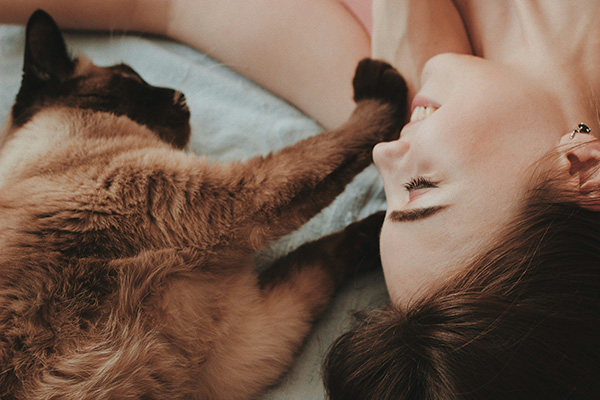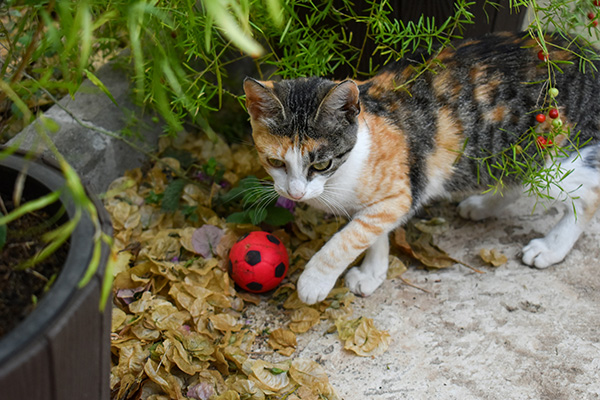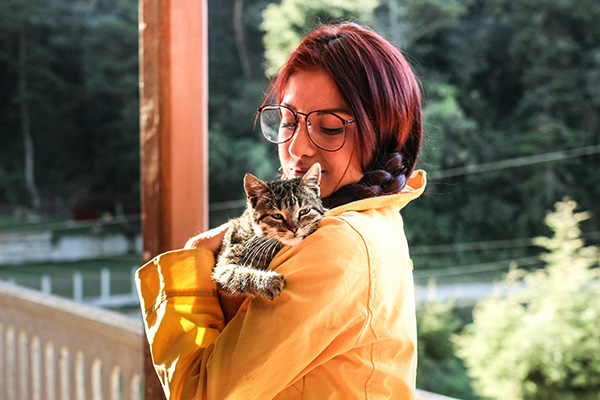Many pet owners observe cats eating human hair, a common yet puzzling strange cat behavior. While it may seem strange, understanding the underlying reasons can help address and manage this behavior effectively. Cats chew on hair for various reasons, including seeking affection, playing, alleviating stress, or even due to nutritional deficiencies. Recognizing the specific cause is crucial in finding appropriate solutions and ensuring your feline friend’s well-being.
In this article, we will explore the different motivations behind this quirky habit and provide practical tips to help discourage it, promoting a healthier and happier relationship between you and your cat.
Common Reasons Why Cats Chewing On Your Hair
Affection and Bonding

Affection and bonding are common reasons why cats chew on your hair. Cats use grooming, or allogrooming (mutual grooming), to show affection and strengthen bonds with their preferred humans, similar to how they groom other cats they care about. This behavior is a sign of trust and affection, as your cat treats you like a member of their feline family. By chewing and licking your hair, your cat engages in a bonding activity, reinforcing the social bond between you two. Understanding this can help you appreciate the gesture, even if it requires redirection to more appropriate behaviors.
Attention-Seeking
Your cat eating your hair can be a way for a cat to seek attention from you. Cats quickly learn that chewing or eating their owner's hair can get the desired attention, whether it's being petted, played with, or simply talked to. This behavior often develops if the cat feels neglected or the owner inadvertently reinforces it by responding affectionately.
By understanding that your cat might be seeking more interaction, you can address the root cause by increasing playtime, offering more affection, and providing stimulating toys to keep your cat engaged and happy.
Stress and Anxiety
Stress and anxiety can lead to a cat chewing on your hair as a coping mechanism, much like nail-biting in humans. When cats face changes in their household or routine, such as moving, the arrival of new pets, or shifts in their daily schedule, they may experience increased anxiety. Chewing or consuming hair serves as a calming practice that aids individuals in coping with stress.
Recognizing and addressing these stress factors, alongside creating a tranquil environment, can effectively diminish this behavior. Consulting a veterinarian for advice on anxiety-reducing products or techniques can also be beneficial.
Playfulness

Playfulness is another common reason why cats eat human hair. To a playful cat, hair can resemble string or ribbons, which are favorite toys for many felines. The movement of hair, especially when it sways or dangles, can be particularly enticing, turning it into an irresistible target for a curious and energetic cat. This behavior is commonly observed in younger cats or kittens as they explore their environment and seek amusement. Providing various engaging toys and interactive play sessions can help divert their attention from your hair and satisfy their playful instincts.
Early Weaning or Abandonment
Early weaning or abandonment can lead to hair-chewing behaviors in cats. Kittens weaned too early from their mothers may develop habits like sucking or chewing on hair as a comforting action, mimicking the nursing behavior they missed out on. This behavior serves as a self-soothing mechanism, providing a sense of security and comfort. By offering alternative comfort items, such as soft blankets or chew toys, and ensuring a stable and nurturing environment, you can help reduce this behavior. Consulting a veterinarian for additional strategies to support your cat's emotional needs can also be beneficial.
Nutritional Deficiencies

Nutritional deficiencies can sometimes lead to hair-chewing behavior in cats. When a cat's diet lacks essential nutrients, they may develop pica, a condition where they eat non-food items like hair. This behavior could be a means for the cat to fulfill nutritional deficiencies. Cat breeds like Siamese, Tonkinese, and Burmese are more common to pica than other breeds. If you suspect a nutritional deficiency, consult a veterinarian to evaluate your cat’s diet and health. Veterinarians may suggest dietary modifications or supplements to address any deficiencies. Providing a balanced and nutritious diet can help reduce this behavior and promote overall feline health.
Waking You Up
Waking you up is a common reason why cats might chew on their owner’s hair. Cats may engage in this behavior to get your attention, often because they are hungry or bored. By nibbling on your hair, they aim to rouse you, hoping you will feed them or provide some form of interaction. This behavior is more common when cats are naturally more active in the early morning hours.
To mitigate this, ensure your cat has enough food before bedtime and provide stimulating toys to keep them occupied during the night. Maintaining a regular feeding and play schedule can also contribute to minimizing this behavior.
FAQs
Is it safe for my cat to eat human hair?
While occasional hair chewing is generally harmless, it can pose health risks if the cat ingests a significant amount of hair. When ingested, hair can accumulate into hairballs, potentially causing digestive issues and even intestinal blockages. If a cat consumes hair products like shampoo or conditioner, it could be exposed to harmful chemicals. Thus, it is advisable to discourage this behavior to avoid potential health problems. Regular grooming and providing a balanced diet can also help minimize the risk of ingesting hair.
How can I stop my cat from chewing my hair?
To stop your cat from chewing your hair, provide plenty of alternative chew toys or cat grass to redirect their attention. Increasing playtime and interaction with your cat can help reduce boredom and stress, which are common triggers for this behavior. Establishing a calm and stress-free environment is essential, as anxiety can cause hair chewing. Employ positive reinforcement to reward your cat for appropriate behaviors. If the issue continues, seek advice from a veterinarian or pet behaviorist. They can help identify underlying problems and suggest additional behavior management strategies.
Can hair chewing be a sign of a health problem?
Yes, hair chewing can sometimes signal underlying health issues, such as nutritional deficiencies or pica, a disorder where animals consume non-food items. If your cat’s hair chewing is excessive or accompanied by other unusual behaviors like lethargy, weight loss, or changes in appetite, it's advisable to consult a veterinarian. They can perform a comprehensive examination and suggest tests to identify any underlying health issues that need to be addressed. Early detection and treatment of these health issues can help prevent more severe complications.
Is hair chewing related to my cat's diet?
Hair chewing can be related to dietary issues, especially if your cat has nutritional deficiencies. Ensuring your cat receives a balanced diet that includes all essential nutrients can help reduce the likelihood of this behavior. If you suspect a nutritional deficiency might be causing your cat to chew hair, consult your veterinarian. They may suggest dietary adjustments or supplements to correct any deficiencies. Offering a balanced diet is essential for maintaining your cat's overall health and well-being.
Why does my cat chew my hair when I’m sleeping?
Cats may chew your hair while sleeping to wake you up, often because they are hungry, bored, or seeking attention. This behavior can be particularly disruptive when cats are naturally more active during early morning hours. To mitigate this, ensure your cat has enough food before bedtime and provide stimulating toys to keep them occupied. Creating a consistent feeding and play schedule can also help reduce this behavior. Additionally, creating a comfortable sleeping environment for your cat can encourage them to rest through the night.
Can early weaning cause my cat to chew on hair?
Yes, kittens weaned too early from their mothers may develop habits like sucking or chewing on hair as a comforting action. This behavior mimics the nursing they missed out on and provides a sense of security. Offering alternative comfort items, such as soft blankets or chew toys, and ensuring a stable and nurturing environment can help reduce this behavior. If the hair chewing persists, consulting a veterinarian for additional strategies to support your cat's emotional needs can also be beneficial.
How do I know if my cat’s hair chewing is due to stress?
If your cat’s hair chewing coincides with changes in the household or routine, such as moving, the arrival of new pets, or shifts in your schedule, it may be stress-related. Additional signs of stress in cats include hiding, excessive grooming, changes in appetite, and increased vocalization. To manage stress, create a calm environment for your cat by providing hiding spots, using calming products like pheromone diffusers, and maintaining a consistent routine. Consulting with a veterinarian can also help identify specific stressors and provide additional strategies to reduce anxiety and manage hair-chewing behavior.
Why Does My Cat Bite My Hair After I Shower?
Cats may bite your hair after you shower for several reasons. The fresh scent and wet texture of your hair can intrigue them due to the use of shampoos and conditioners. This change can prompt exploration through cat licking and biting. Moreover, cats frequently seek attention and may have learned that this behavior prompts a response from their owners. Grooming instincts also play a role; cats groom each other to show affection and may extend this to you. Lastly, wet hair can resemble toys, making it an interesting object for play. To manage this, redirect your cat’s attention to toys or treats after your shower, and consider using a different shampoo scent that’s less appealing to them.
